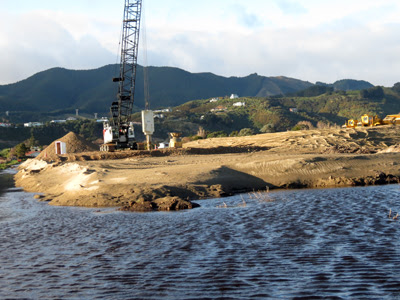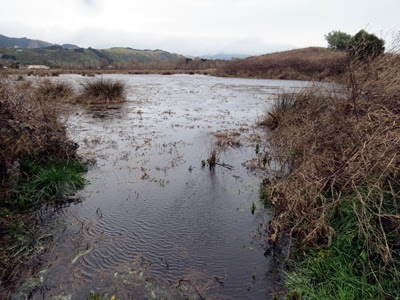Welcome to the Midnight Collective Broadsheet 86
Actively
supporting NZ’s endangered wetland birds
 |
| Dismasted tree - Raumati dune lake |
The privatisation of public assets and
responsibilities has hit a major land mine over recent weeks with the
revelation that prisoners in Serco-run privatised New Zealand jails have been left ineffectively supervised and so
taken them over.
 |
| Rear view |
The issues are politically intriguing
because they expose the credo behind the move as foolishly utopian – an
ideology that you can have your cake
and eat it. These privatised prisons were not only going to be run more
cheaply, they were also going to turn out much higher rehabilitation
rates.
 |
| This is not a wetland |
Nobody queried this, or the uninterrupted stream of media puff issued by the company
and the Minister supposedly left in charge, until videos began appearing on the
internet, of organised fighting and drug taking.
 |
| White faced heron with NZTA crane Raumtai Beach Dune Lake |
The issues raised, run deeply into our free
and democratic way of life. Once you pass responsibility into private hands you
have ceded control to an organisation whose authority structures are not
democratic and whose first commitment lies in protecting itself. During this imbroglio they had to fly the CEO of SERCO into the country to hold a two hour meeting
with the minister, before pretending to fire him.
 |
| A sisyphic task - digging out the Raumati Beach dune lake |
Forty years ago there would have been a lot closer
relationship between a minister and his CEO as we would expect in running a
healthy, open society. A business ethic of secrecy has replaced that ideal and these
companies have erected a wall of feel good flutter around themselves. This has
proved very effective in an era where the mainstream media, obsessed with
ratings, are employing celebrity presenters and peppering their news bulletins
with celebrity tripe.
 |
| Dune lake with grey teal and parera-cross ducks |
This disquieting fiasco runs right
through the initiatives of this Government as it prepares to privatise mental
health and child welfare services. It also tells the story of our wetland.
Scientific evidence, collated by a
private firm, was presented to the Board of Inquiry issuing consents for this
expressway, that this dune lake was not a wetland. This evidence was accepted
by the Board. You can see from the accompanying photographs how wrong they
were. This error however isn’t a mistake of observation made by incompetent
scientists. It is part of a widespread culture of organised misrepresentation.
To be continued…
Track we were listening to while posting
this Your Cheatin’ Heart The Keil Isles. What were these Samoan boys (with Eliza) doing to US rock n roll in the late 1950’s and
early sixties? They brought their own pacific island fizz in mixing rhythm and
blues with country and turning it into rockabilly around the same time Johnny
Cash was doing the same.
Your cheatin' heart
Will pine some day
And crave the love
You threw away
The time will come
When you'll be blue
Your cheatin' heart will tell on you..

















